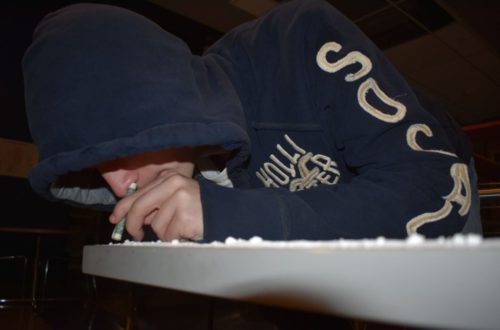Upstate New York’s deadly drug epidemic does not leave Hudson Valley unscathed

By: Zoe Deno
Editor-in-Chief
&
Angela Scipione
News Editor
“In 2016, 399 people died from overdoses involving prescription opioids, heroin and fentanyl in the 32 counties of the Northern District of New York,” said United States Attorney Grant C. Jaquith.
Does Hudson Valley Community College reflect the trend?
The Hudsonian conducted an anonymous survey containing 150 students’ ideas on whether their drug opinions.
Of the Hudson Valley students surveyed 51% of them know someone who has died from drug abuse.
HVCC students have varying thoughts on the epidemic. Multiple students believe legislation should not be involved.
“Laws have no effect on the usage of drugs aside from criminalizing and marginalizing certain parts of society. [These people were going to use] these drugs regardless of what the government tells them,” said one student.
This student believes the United States must undergo radical change in societal attitudes towards drugs before the country can achieve reform.
“The most defeating [thing to see when you’re an addict] is people who are clean act as if they are more of a person than you are. It wasn’t until I saw compassion from other [people] that I began to believe I was worth it to be clean,” said one student.
In concern for others who are struggling, this student said, “There seems to be people who know nothing about drug use, who take pride in creating even more distance between themselves and people who struggle with addiction. [They] are demonizing people who aren’t all that different from them.”
The person said addiction is a disease which is infectious to the brain. The person who is addicted needs sympathy and treatment. Imprisonment and judgment would make it worse.
Another student said, “Looking back [to when I was struggling with addiction], I felt that society already deemed me lost so it was hopeless to change.”
“The larger issue, in my opinion, is that mental health issues are going undiagnosed,” another student who has struggled with addiction said, “They think that many people use drugs as an escape instead of working towards improving their mental and emotional health.”
A student’s mother struggled with addiction when they were growing up. “I had no mother figure and it affected my self-confidence and the choices I made growing up. I too was addicted to drugs and made a series of [bad] choices,” they said.
This student dropped out of school and began binge drinking and smoking marijuana excessively. The student ended up getting a DUI.
They said, “I made the decision to stop the cycle of dysfunction, but sadly many people don’t. I have a good friend who overdosed and died in bed while she was sleeping with her daughter. Now, because of drugs, my friend’s daughter had to grow up without a mother.”
Some students don’t believe addiction will necessarily be a problem if you know your limits.
“It’s fine to use drugs occasionally in a safe environment as long as you’re able to be honest with yourself. I know that addicts don’t have much free will in the matter, but I think if you can be honest with yourself you can address the problem before it gets out of control,” a student said.
This student knows they have a genetic predisposition to alcoholism and use this knowledge to control their drinking. They acknowledge when they have been drinking more than usual, they try to figure out the cause rather than continuing.
People take drugs for many different reasons. One student suggested whether it’s for recreation or prescription, “The simple fact is that they’re both taking a medication that does the exact same thing to both of their brains. There should be no discrimination or stigma.”
